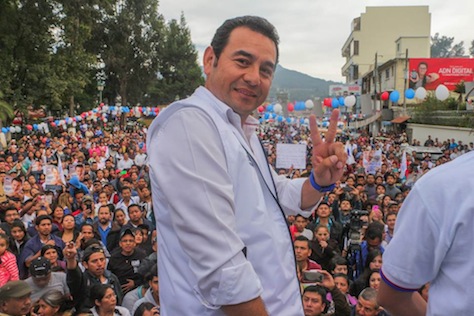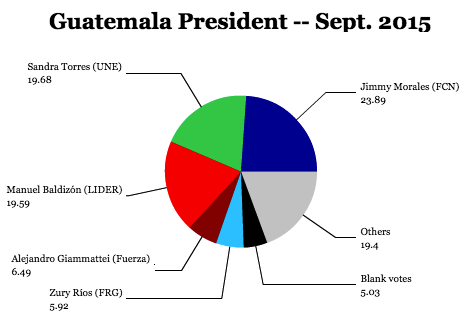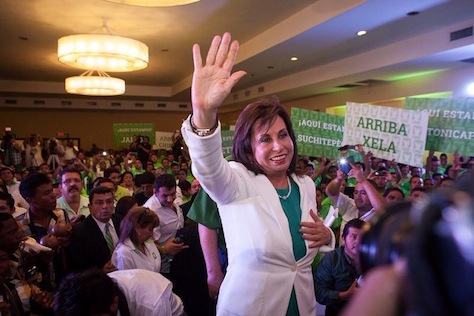It was already tumultuous and historic week in Guatemala.![]()
The country’s congress, after months of protest, stripped a sitting president of his immunity from prosecution. That president, Otto Pérez Molina, subsequently resigned, and officials then arrested and imprisoned him on corruption charges in relation to a scandal that’s already swept up more than a dozen ministers and Pérez Molina’s former vice president, who resigned in July.
Nevertheless, Guatemalans went to the polls on Sunday to choose both a new president and the entire 158-member Congreso, among other local municipality offices. Unsurprisingly, none of the presidential candidates won an absolute majority, so Guatemalans will vote again in an October 25 runoff.
One of the candidates in that runoff will be independent candidate Jimmy Morales (pictured above), the leader of the previously little-known Frente de Convergencia Nacional (FCN, National Convergence Front). A comedian, Morales is a political neophyte whose campaign has railed against Guatemala’s political elite, a call that’s resonated as this week’s crisis hit its crescendo.
* * * * *
RELATED: Yes, progress in Central America, but don’t call it a ‘spring’
* * * * *
Sounding an anti-corruption note tempered by social conservatism and nationalist tones, Morales has the populist momentum heading into the runoff because he’s a newcomer viewed as unsullied by the sordid taint of corruption that infects more established politicians, including his two main rivals.
Like Costa Rica’s president Luis Guillermo Solís, who rode a wave of disgust with the scandal-plagued government of outgoing president Laura Chinchilla in that country’s fascinating election last year, Morales seems well placed to capture the spirit that brought down Pérez Molina. Unlike Solís, however, who was a technocratic academic involved in some of Central America’s most important diplomatic negotiations of the past quarter-century, the populist newcomer and actor and comedian has virtually no governing experience.
For now, at least, it seems like Morales will face an unexpected challenger in the runoff in former first lady Sandra Torres (pictured above), who edged ahead of one-time frontrunner Manuel Baldizón, the runner-up of the 2011 presidential vote. Torres, a social democratic candidate leading the Unidad Nacional de la Esperanza (UNE, National Unity of Hope), the party founded by her husband (technically former husband), former president Álvaro Colom, who held the presidency between 2008 and 2012.
With 98.23% of the preliminary vote counted, Torres leads Baldizón by just 4,468 votes — a margin of just 0.09% of the total vote. So there’s still some uncertainty about whether Torres will hold onto the second spot in the runoff against Morales. Fully 347 of over 19,500 stations have yet to report, final results will not be available until Friday, and there’s no hint that the well-financed Baldizón campaign will simply give up even if Torres officially wins. Although there are seven weeks before the second-round vote, Torres and Baldizón might easily spend much of that time fighting each other over the first-round results — all while Morales focuses squarely on building a majority coalition.
Make no mistake, the result shows just how far Baldizón has fallen, though his collapse isn’t totally unexpected. Perhaps in recognition of the fact that since the return of Guatemalan democracy, every runner-up has gone on to win the following election, Baldizón ran on the uninspirational slogan, Le toca, which translates to ‘It’s his turn.’
Baldizón formed the Libertad Democrática Renovada (LIDER, Renewed Democratic Liberty) in 2010 as a platform to contest the 2011 elections, even though he previously supported Colom and the UNE. Nevertheless, his party has become a conservative force and an ally of Pérez Molina’s Partido Patriota (PP, Patriotic Party) — so much so that more Patriotic Party deputies showed up last week to vote against their own president than LIDER deputies, who chiefly abstained. Until last week, moreover, Baldizón resisted the popular calls on his party to support the suspension of Pérez Molina’s presidential immunity, and LIDER’s support essentially floated Pérez Molina’s presidency since news of the widespread customs tax fraud scandal broke in April. LIDER, too, is subject to accusations of dodgy campaign finance, including cash from drug traffickers, support-buying and complaints of other election law violations. All of which meant that Baldizón’s once-strong lead evaporated as the so-called ‘La Linea‘ scandal and corresponding protests against entrenched corruption intensified in seriousness.
Torres will probably be a better candidate against Morales than Baldizón, and she (like Morales) has called for the continuation of the United Nations commission, the Comisión Internacional Contra la Impunidad en Guatemala (CICIG) that brought the customs tax scandal to light. Though she probably also has more credibility on corruption than Baldizón, that’s not saying much. Colom, the first center-left president of the country in recent memory, turned a blind eye to corruption, even if he never faced personal inquiries like Pérez Molina and former president Alfonso Portillo (who returned to Guatemala earlier this year after serving a sentence in US prison for money laundering). Moreover, as first lady, Torres divorced Colom in 2011 in an ill-fated attempt to run for the presidency. Though Torres argued that she was making a sacrifice to be ‘married to the Guatemalan people,’ the country’s constitutional court was unconvinced and barred Torres’s presidential bid anyway as a violation of the one-term limit.
So what comes next?
Morales’s support comes chiefly from urban voters predominantly in the more populous south. Though he has clear momentum, he still won no more than 24% of the first-round vote, which means he’ll need to double it in the runoff to win the presidency from an electorate that’s still unconvinced about his experience. LIDER, UNE and TODOS, a centrist party, all won more support in the legislative elections, and the FCN may not even boast a double-digit caucus in Guatemala’s congress, let alone a governing majority (and, yes, that will make it incredibly difficult for Morales to govern if he wins in October). Morales, for now, eschews any alliance with UNE or LIDER, which would undermine the premise of his campaign. No matter who he faces in the runoff, he can credibly portray Torres and Baldizón as two sides of the same corrupt coin. But he will need the votes of smaller parties (especially TODOS), as well as the 5% of those voters who cast blank ballots and others who didn’t bother to vote at all. So long as Torres will remain his challenger, Baldizón’s supporters might find more in common ideologically with Torres, though party ties in Guatemala are still far more personality based.
Torres, who said on Monday that she has nothing in common with Baldizón (so don’t expect an alliance anytime soon), has a much stronger organization than Morales. Such are the benefits, legal or otherwise, of a pre-existing party structure, especially for mobilizing voters in Guatemala’s rural districts. Her best argument will be that she is more experienced and can carry forward more effectively the anti-corruption agenda than Morales while pointing out the differences between herself and conservatives like Baldizón and Pérez Molina.
Baldizón, who was a businessman before entering politics, will not easily give up on the presidency that’s he has pursued for more than a decade. He’s been running for the office since nearly the day he lost the last election in 2011, and LIDER, which won more votes than any other party in the simultaneous congressional elections on Sunday, is now the most powerful force of the Guatemalan right and will likely command more seats than any other party (including Torres’s UNE or Morales’s FCN) in the Guatemalan Congress. There’s no rulebook for a candidate like Baldizón — no example like, in the United States, Richard Nixon’s graceful 1960 concession or even a supreme court ruling like 2000’s Bush v. Gore. Much of the clarity for the runoff depends on Baldizón himself, and the longer he spends tying up Torres in legal or political battles can only strengthen Morales.


